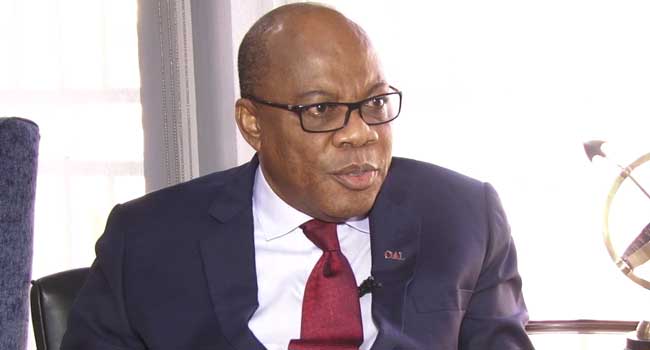A petition written by a former president of Nigeria Bar Association (NBA) Olisa Agbakoba, SAN to the National Judicial Council against CCT chairman Danladi Umar is creating fresh confusion within the judiciary.
Agbakoba had, in his petition, explained why Umar should should not preside over the trial of the CJN.
It was revealed that the petiton has been consequently forwarded to the Federal Judicial Service Commission.
According to a reliable source, “Some issues have arisen over the petition sent to FJSC because the CCT chairman is not a judicial officer per se. He is not on the judiciary payroll and he reports to the presidency.
“When sworn in, the CCT chairman only took the Oath of Allegiance and Oath of Office meant for public officers. The Judicial Oath was not administered on him.
“The CCT chairman does not collect judicial remunerations and allowances.
“I think the framers of the constitution anticipated this kind of situation and they left CCT on its own without any influence either from the Executive or the Judiciary.
“If the CCT chairman had been a judicial officer, he would not be in a position to try the CJN who will be his boss.
“Also, if you look at the Judicial Oath in the Seventh Schedule to 1999 Constitution, only the CCT chairman was left out of the list of those who should take it.
The Judicial Oath reads: “I, …… do solemnly swear/affirm that I will be faithful and bear true allegiance to the Federal Republic of Nigeria; that as Chief Justice of Nigeria/Justice of the Supreme Court/President/Justice of the Court of Appeal/Chief Judge/Judge of the Federal High Court/Chief Judge/Judge of the High Court of the Federal Capital Territory, Abuja/Chief Judge of …… State/Judge of the High Court of …… State/Grand Kadi/Kadi of the Sharia Court of Appeal of the Federal Capital Territory, Abuja/ Grand Kadi/Kadi of the Sharia Court of Appeal of …. State/President/Judge of the Customary Court of Appeal of the Federal Capital Territory, Abuja/President/Judge of the Customary Court of Appeal of ……… State. I will discharge my duties, and perform my functions honestly, to the best of my ability and faithfully in accordance with the Constitution of the Federal Republic of Nigeria and the law, that I will abide by the Code of Conduct contained in the Fifth Schedule to the Constitution of the Federal Republic of Nigeria; that I will not allow my personal interest to influence my official conduct or my official decisions; that I will preserve, protect and defend the Constitution of the Federal Republic of Nigeria.”? But a Senior Advocate of Nigeria, who spoke in confidence, said the FJSC can exercise disciplinary control on the CCT chairman.”
Agbakoba said “I think the NJC was right in referring Agbakoba’s petition against Danladi Umar to the FJSC. The CCT chairman is no an island unto himself.
Read also: Campaign: Buhari, APC Next Level train arrives Dutse, Jigawa
“If you look at paragraph 13 part 1 of the Third Schedule to the 1999 Constitution of the Federal Republic of Nigeria, FJSC is empowered to discipline the CCT chairman.
The section says: “The Federal Judicial Service Commission has power to:
(a). Advise the National Judicial Council in nominating persons for appointments to the office of :
- The Chief Justice of Nigeria,
- A Justice of the Supreme Court,
- The President of the Court of Appeal,
- A Justice of the Court of Appeal,
- The Chief Judge of the Federal High Court,
- A Judge of the Federal High Court,
- The President of the National Industrial Court;
- A judge of the National Industrial Court; and
- the Chairman and Members of the Code of Conduct Tribunal,
b). Recommend to the National Judicial Council the removal of any of the Judicial Officers mentioned in sub-paragraph (a) above
c). Appoint, dismiss and exercise disciplinary control over the Chief Registrars and Deputy Chief Registrars of the Supreme Court, the Court of Appeal, the Federal High Court, the National Industrial Court and all other members of the staff of the Judicial Service of the Federation not otherwise specified in this Constitution and of the Federal Judicial Service Commission.”
Explaining why the FJSC is yet to serve the the CCT chairman any copy of the petition, another source said: “I think the FJSC is also weighing options on the petition and issues around the trial of the CJN and the status of the CCT chairman.
“If you look at the composition of the NJC, the CJN is the chairman. Both Onnoghen and the Acting CJN, Justice Ibrahim Tanko Muhammad who should preside over FJSC have been queried by the National Judicial Council(NJC).
“Also, the Attorney-General of the Federation, Mr. Abubakar Malami(SAN), who is a member of the FJSC, is in charge of the OAGF prosecuting CJN Onnoghen.
“The case at hand is jut interwoven. The more issues crop up, the more complex we dip into crisis in the Judiciary.”
Paragraph 12, part 1 of the Third Schedule to the 1999 constitution of the Federal Republic of Nigeria, as amended, stipulates the composition of Federal Judicial Service Commission as follows:
The Federal Judicial Service Commission shall comprise the following members:
1.The Chief Justice of Nigeria, who shall be the Chairman;
- The Chief Justice of Nigeria, who shall be the Chairman;
- The President of the Court of Appeal;
- The Attorney-General of the Federation;
- The Chief Judge of the Federal High Court;
- The President of the National Industrial Court;
- Two persons, each of whom has been qualified to practice as a Legal Practitioners in Nigeria for a period of not less than fifteen years, from a list of not less than four persons so qualified and recommended by the Nigerian Bar Association; and
- Two other persons, not being Legal Practitioners, who in the opinion of the President are of unquestionable integrity.

